|
|
|
Sort Order |
|
|
|
Items / Page
|
|
|
|
|
|
|
| Srl | Item |
| 1 |
ID:
177790
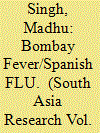

|
|
|
|
|
| Summary/Abstract |
In view of the topicality of pandemics, this brief article discusses the responses of the vernacular press in Bombay during 1918 following the influenza pandemic of that year. With occasional inputs from English language dailies, such as The Times of India and The Hindu of the period, the aim is to understand how, as the epidemic receded, the government’s response to the epidemic was questioned and the influenza epidemic was constructed as a part of anticolonial rhetoric by the ‘native press’, closely monitored by the British.
|
|
|
|
|
|
|
|
|
|
|
|
|
|
|
|
| 2 |
ID:
144687
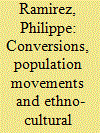

|
|
|
|
|
| Summary/Abstract |
In Northeast India, ethnic and religious conversions may be intimately associated. In the Assam–Meghalaya borderlands, conversions to Christianity throughout the twentieth century introduced a new factor in the interplay of spatial movements and cultural mutations, without fundamentally disrupting its basic principles. It is these complex dynamics that are described in this article through the history of three localities. Epidemics, religious conversions and cultural segmentation largely account for the present distribution of ethnicities.
|
|
|
|
|
|
|
|
|
|
|
|
|
|
|
|
| 3 |
ID:
113310


|
|
|
|
|
| Publication |
2012.
|
| Summary/Abstract |
In November 2002, a man with 'atypical pneumonia' treated in Foshan hospital, Guangdong Province, in the People's Republic of China, was the first known case of Severe Acute Respiratory Syndrome (SARS). However, it was not until April 2003 that the Chinese government admitted to the full scale of 'atypical pneumonia' cases infected with SARS, two months after the disease had rapidly spread across the world with initial infections in Hong Kong and Vietnam sourced to Guangdong. In 2008, Zimbabwe experienced one of the biggest outbreaks of cholera ever recorded. By February 2009, the disease had spread across all of Zimbabwe's 10 provinces and to neighbouring countries-Botswana, South Africa, Zambia and Mozambique-causing thousands of infections amongst their populations. This article seeks to examine what duties the Chinese and Zimbabwe states had to protect their citizens and the international community from these outbreaks. The article refers to the findings of the International Law Commission's study into the role of states and international organisations in protecting persons in the event of a disaster to consider whether there is an international duty to protect persons from epidemics. The article concludes that both cases reveal a growing concept of protection that entails an international duty to assist individuals when an affected state proves unwilling or unable to assist its own population in the event of a disease outbreak.
|
|
|
|
|
|
|
|
|
|
|
|
|
|
|
|
| 4 |
ID:
162479
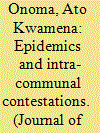

|
|
|
|
|
| Summary/Abstract |
As the Ebola epidemic ravaged the Mano River Basin in 2014, there was concern in Senegal that the resident Peul community of Guinean origins will cause the spread of the disease to Senegal. These fears went unrealized as the Peul migrants embraced many of the epidemic control and prevention measures, which often distanced them from primordial publics in Guinea. While partly motivated by concern over the dangers of Ebola, Peul migrants embraced these measures also because the epidemic and measures advocated to curb it allowed them to assert greater autonomy in their often-fractious relations with primordial publics in their places of origin in Guinea. Their embrace of these measures suggests a rethink of the emphasis on intercommunal strife, intra-communal conviviality and trenchant state-society chasms, which pervades much work on the political economy of postcolonial Africa and which draws significant inspiration from the work of Peter Ekeh.
|
|
|
|
|
|
|
|
|
|
|
|
|
|
|
|
| 5 |
ID:
182582
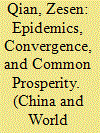

|
|
|
|
|
| Summary/Abstract |
This article investigates the impact of previous epidemics on rural development and convergence, and identifies the impact's mechanism based on convergence tests. Using a balanced panel of 31 provinces, the empirical results from 2002 to 2019 show that epidemics decelerated convergence in rural per capita income. The mechanism analysis shows that the accelerated divergence in wages and the decelerated convergence in business income were the major drivers, which also led to decelerated convergence in rural per capita consumption. Although epidemics have not threatened rural food consumption and the Engel coefficient of rural households, these two indicators of basic living needs have failed to achieve convergence across regions. The overall impact of an epidemic on convergence in rural–urban income disparity has also been insignificant, indicating that epidemics have affected rural and urban development simultaneously. Finally, COVID-19 is likely to decelerate convergence in rural income, rural consumption, and urban income.
|
|
|
|
|
|
|
|
|
|
|
|
|
|
|
|
| 6 |
ID:
140558
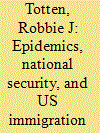

|
|
|
|
|
| Summary/Abstract |
What are relationships between epidemics, national security, and US immigration policy? This question is important because it sheds light on transnational or nontraditional security areas, American immigration policy, and a pressing issue for US leaders who have recently faced epidemics such as the West Africa Ebola outbreak that began in 2013. This article answers it and lays ground in the area by reviewing epidemics in world history, using International Relations and Security Studies works to specify dangers of contagions for states, and identifying three general immigration measures that American leaders have utilized from the seventeenth century to the present day to protect against contagions, which are (1) policies restricting entrance of foreigners thought to carry specified diseases, (2) the isolation or quarantining of immigrants with contagious disease, and (3) delegating the President with authority to stop immigration in the event of an epidemic abroad. This study has implications for research and contemporary US immigration policy.
|
|
|
|
|
|
|
|
|
|
|
|
|
|
|
|
| 7 |
ID:
183921


|
|
|
|
|
| Summary/Abstract |
Ebola Virus Disease struck Sierra Leone in May 2014. An international response was instrumental in ending the epidemic by December 2015 and has been extensively documented. Less attention has been paid to local responses. Here, we focus on a case in which there was no infection despite high infection in neighbouring areas. This brings into focus the role of customary public authority in implementing successful controls. We pay particular attention to the activities of a chiefdom Ebola Task force committee chaired by the Paramount Chief. Meetings were characterised by protocol and ceremony, but ‘face time’ served to reinforce, in ritual terms, important messages about quarantine and social distancing. The committee's pronouncements had illocutionary force. Local volunteers translated this ceremonial message into practical action to block imported cases. The analysis of ceremonial competence, we conclude, opens a window into how public authority addresses developmental shocks in Africa.
|
|
|
|
|
|
|
|
|
|
|
|
|
|
|
|
| 8 |
ID:
183933


|
|
|
|
|
| Summary/Abstract |
This paper studies the Korean War from an environmental perspective. The paper examines the political background that aggravated environmental damage and the ways in which hydro-warfare, ecological warfare, and epidemics are interconnected. By focusing on environmental destruction during the Korean War, this research questions the view of post-1950s industrialization and urbanization as the main sources of environmental crisis on the Korean Peninsula. The paper examines some of the major wartime disasters, such as the destruction of hydroelectric and irrigation dams and epidemic outbreaks. Special attention is given to the impact of aerial bombing, which not only resulted in the deaths of millions, but also created a chain effect of environmental destruction, population displacement, flooding, famine, and epidemic outbreaks. In revisiting them, it conclusively looks at the impact that military activities have on the environment and how the Korean War foreshadowed the rise of environmental warfare during the Cold War.
|
|
|
|
|
|
|
|
|
|
|
|
|
|
|
|
| 9 |
ID:
177694
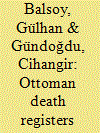

|
|
|
|
|
| Summary/Abstract |
This article presents an analysis of the first recognisably modern-style death registers in the Ottoman Empire. These were produced, in 1838–9, as a result of the state’s reaction to the cholera pandemic of 1831. This article shows how these registers were designed and structured, how they differed to those that preceded and came after them and so occupied a key point in the transition to the medicalisation of death and the import of Western-style statistical analysis. The article demonstrates how these registers offer details that can be used to build a picture of the social, economic and demographic profile of death in Istanbul in these years.
|
|
|
|
|
|
|
|
|
|
|
|
|
|
|
|
| 10 |
ID:
174908
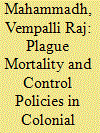

|
|
|
|
|
| Summary/Abstract |
Focused on colonial South India, this article presents and assesses detailed archival records of public health measures in response to plague outbreaks between 1900 and 1947. Starting in 1897 in the Madras Presidency, the colonial government strictly implemented anti-plague measures and introduced various health schemes and medical policies for plague prevention. However, despite partly vigorous government efforts, plague outbreaks could not be fully controlled. In the twentieth and twenty-first centuries, the plague remains among South Asia’s most feared epidemics, with an outbreak in Surat in 1994 causing major havoc. Neither indigenous knowledge nor Western medical systems provided fully effective remedies regarding causation, cure and prevention of plague epidemics. Since the article gained new relevance in light of current struggles faced by India’s public health system in handling the ongoing COVID-19 pandemic, some lessons from history emerge in the concluding discussion.
|
|
|
|
|
|
|
|
|
|
|
|
|
|
|
|
| 11 |
ID:
191050
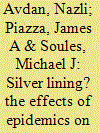

|
|
|
|
|
| Summary/Abstract |
In this study we examine the effects of epidemics on terrorist groups’ attack capacities. We consider two theoretical relationships between epidemics and terrorist groups. By weakening government counterterrorism defenses and increasing popular grievances, epidemics can provide a strategic environment that is conducive to terrorist groups, enhancing their capacity to commit more attacks, yield higher casualties and launch more logistically complex attacks. Conversely, epidemics can impair the abilities of terrorist groups to launch attacks by eroding group capacity and access to resources while incentivizing the state to increase its surveillance and policing capabilities. We test these two competing arguments using a database of over 620 terrorist groups for the period of 1970 to 2016. Our findings support the second argument. Terrorist groups based or operating in countries experiencing more and more intense epidemics commit fewer attacks, generally produce fewer casualties, commit a lower ratio of transnational to domestic attacks and less frequently use multi-mode attacks. We conclude with a discussion of the implications of these findings.
|
|
|
|
|
|
|
|
|
|
|
|
|
|
|
|
| 12 |
ID:
129283


|
|
|
|
|
| Publication |
2012.
|
| Summary/Abstract |
The article presents a speech by Chinese President Hu Jintao, delivered at the General Meeting in China on December 20, 2009, in which he discussed the celebration of the 10th anniversary of the return of Macau, China to the country, financial crisis, and the severe acute respiratory syndrome (SARS) epidemic.
|
|
|
|
|
|
|
|
|
|
|
|
|
|
|
|
| 13 |
ID:
172076
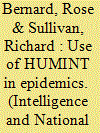

|
|
|
|
|
| Summary/Abstract |
In this article we explore the potential applications for Human Intelligence (HUMINT) operations in Public Health Emergencies of International Concern (PHEICs) and epidemics. We examine the complex circumstances surrounding outbreaks and how these require the synthesis and analysis of new sources of information and intelligence. We explore the benefits from these tactics by examining intelligence gaps and their consequences during the initial stages of the Ebola outbreak of 2014–2016. Finally, we look at what parameters and circumstances would be needed for the application of HUMINT operations in PHEICs and attempt to understand some of the constraints to its use.
|
|
|
|
|
|
|
|
|
|
|
|
|
|
|
|
|
|
|
|
|